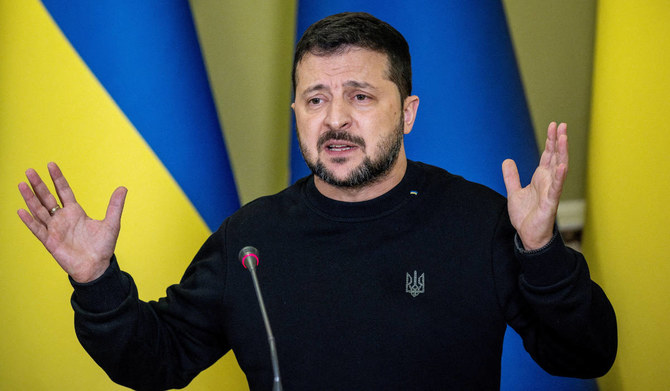KYIV: President Volodymyr Zelensky warned Ukrainians on Sunday to prepare for new waves of Russian attacks on infrastructure as winter approached and said troops were anticipating an onslaught in the eastern theater of the war.
A military spokesman said Russian attacks on the shattered eastern town of Avdiivka had eased in the past day, but were likely to intensify in the coming days.
And Ukrainian military intelligence said an explosion killed at least three Russian servicemen in the Russian-occupied southern town of Melitopol, which it described as an “act of revenge” by resistance groups.
Zelensky issued his warning during his nightly video address a day after Russian forces carried out their first missile attack on the capital, Kyiv in some seven weeks.
“We are almost half way through November and must be prepared for the fact that the enemy may increase the number of drone or missile strikes on our infrastructure,” Zelensky said. “Russia is preparing for Ukraine. And here, in Ukraine, all attention should be focused on defense, on responding to terrorists on everything that Ukraine can do to get through the winter and improve our soldiers’ capabilities.”
Last winter about 10 months into Russia’s invasion of neighbor Ukraine, Russia made waves of attacks on power stations and other plants inked to the energy network, prompting rolling blackouts in widely separated regions.
Energy Minister German Galushchenko said on Saturday that Ukraine would have enough energy resources to get through the winter, but added: “The question is how much future attacks can affect supplies.”
Ukrainian officials last Wednesday said Russia had struck Ukrainian infrastructure 60 times in recent weeks, an indication that a campaign of attacks may already be under way.
In his remarks, Zelensky hailed the “heroic” efforts of troops defending Avdiivka, under pressure from attempted Russian advances since mid-October. Pictures show buildings in the town reduced to shells.
Military spokesman Oleksandr Shtupun said the number of infantry attacks in the past 24 hours was half of levels earlier in the week, but air strikes were on the rise.
“The enemy suffered significant losses the day before yesterday and has to regroup,” Shtupun told national television.
The head of Ukraine’s ground forces, General Oleksandr Syrskyi, said on Telegram that Moscow’s forces were “more active in the Bakhmut sector and trying to recover lost positions.”
Bakhmut, north of the city of Donetsk, was captured by Russian forces in May after months of heavy combat, but Ukrainian troops have since retaken nearby villages.
Russian accounts of the fighting on Sunday said its forces had repelled five Ukrainian attacks near Bakhmut.
Reuters could not verify accounts from either side.
In Melitopol, a hub for Russian occupation forces, the blast killed three men during a meeting at a post office used as a military headquarters, Ukraine’s military intelligence directorate said. The dead were officers of Russia’s National Guard or FSB intelligence service, the directorate said in a statement.
There was no comment from Russian officials.
Ukraine’s military has been increasingly active in attacking Russian-held areas, but does not always acknowledge the strikes.
















